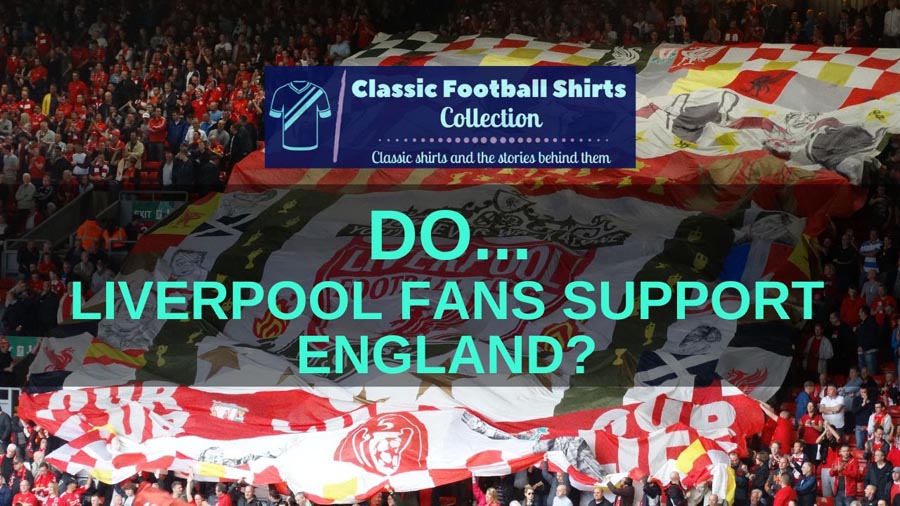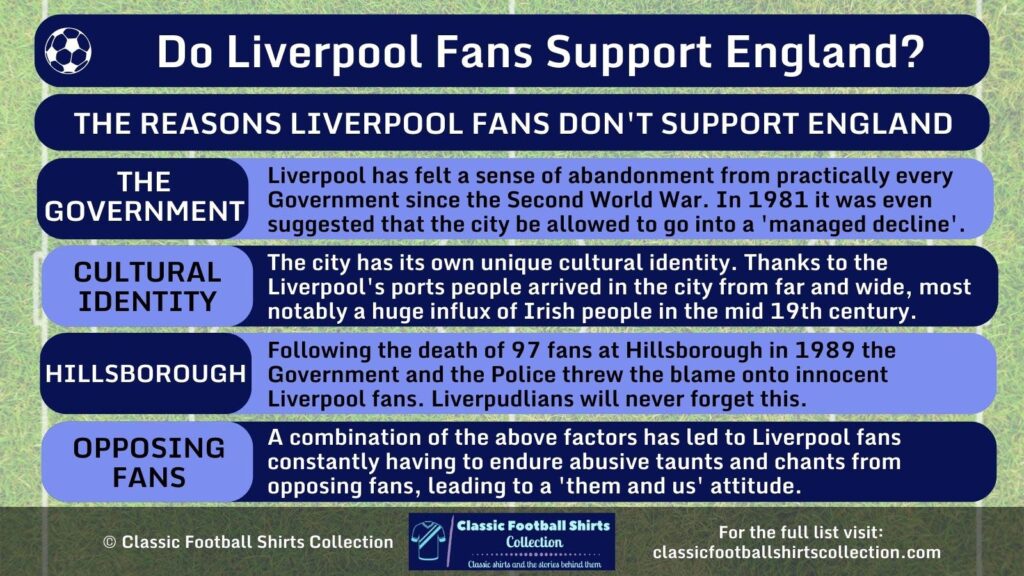
You’ve probably heard the booing of the national anthem by Liverpool fans and you might have heard some declare they don’t consider themselves English.
Why is this? Do Liverpool fans support England? Do Liverpool fans hate England? Do they hate the Royal Family?
So many questions to be answered!
And we are going to try and answer them in this article.
So let’s get started…
Do Liverpool Fans Support England?
Most people from Liverpool do not support or care for England’s national football team. This comes from the way the city has been treated by the establishment since the Second World War, which has led to Liverpudlians feeling a sense of isolation from the rest of England. Throw into the mix a very different cultural heritage and the cover-up following Hillsborough and Liverpudlians tend to feel they have more in common with Ireland than England.

If you have ever been to Liverpool you will be aware that most people there view the city as being different from the rest of England.
In fact ‘Scouse not English’ flags pop up regularly, especially at Anfield.
For two years at University I lived with two Scousers, and at that time I used to regularly make the relatively short trip from Sheffield to Liverpool to watch Everton play.
There are a number of reasons Liverpool fans generally don’t support England.
#1: The Government’s Treatment of the City
From the 1950s onwards Liverpool endured economic hardship, and desperately needed help and investment from the Government, but it is something it never got.
It all began in the aftermath of the Second World War. At the time the British Empire covered 25% of the world and Liverpool was its leading port.
The docks of Liverpool were a hive of activity with goods and industry constantly passing through.
After World War Two, Britain was hobbled by war debt. The British Empire was on the decline, and with it went the economy of Liverpool.
The city felt it got no support from the Government in this post-war fallout period, and that lack of help and support continued right through to the start of the 21st Century.
The longer this went on the more people from Liverpool began to feel completely separate from the Government down in London. And the more they saw themselves as their own separate Scouse entity.
The nadir of this period came in the 1970s and 1980s. People seemingly didn’t want to come to the city as tourists or invest in it as a business.
RELATED ===> Revealed: The Best Retro Liverpool Shirts
This coincided with the rise to prominence of possibly the most reviled person in the history of Liverpool.
Margaret Thatcher became Prime Minister in 1979. Many Liverpudlians place responsibility for the true decline of their city solely on her shoulders.
At the time the city had already felt it has suffered from 30 years of abandonment, and documents released in 2011 charting discussions in 1981 between the then Chancellor Geoffrey Howe and Margaret Thatcher show just how bad things had got.
With Liverpool suffering even more following the Toxteth riots, Howe suggested the best option for dealing with the city was one of ‘managed decline’:
“We do not want to find ourselves concentrating all the limited cash that may have to be made available into Liverpool and having nothing left for possibly more promising areas such as the West Midlands or, even, the North East.
“I cannot help feeling that the option of managed decline is one which we should not forget altogether. We must not expend all our limited resources in trying to make water flow uphill” he said.
Although these sentiments were never admitted publicly at the time, it was still obvious to Liverpudlians that they and the city were very much viewed as second-class citizens, by the Southern-based establishment.
It is something they have never forgotten and likely never will.
#2: The City Has a Very Different Cultural Identity
We have already touched on one of the things that have given Liverpool its own unique cultural identity, the docks.
For hundreds of years people would arrive in the city from far and wide, but mainly Ireland, Wales and Scandinavia and integrate into the thriving community.
RELATED ===> Why Do Irish People Support Liverpool?
When I did research into my unusual surname the strongest suggestion was that it originated hundreds of years ago from Vikings who had settled in Liverpool, where my grandparents on my dad’s side were born and grew up.
But Liverpool’s ports have also attracted people internationally, and the city is home to some of Britain’s oldest African and Chinese communities.
Then of course, in the 18th and 19th centuries, Liverpool was flooded with Irish immigrants due to terrible famines in Ireland as they sought work and a better life.
It is estimated that by the end of the Great Famine of Ireland in 1851 that 25% of the population in Liverpool were Irish-born.
That strong Irish connection obviously remains to this day, and most people from Liverpool feel a much stronger kinship with Ireland than with England, another reason why Liverpool fans don’t support England.
Liverpool is also just across the sea from North Wales, so there is a connection there too.
Liverpool is in the ‘north’ so has that sense of separation from Southern England and London, but its strong ties with Ireland also set it apart from Manchester and other northern cities.
As such Liverpool has its own unique cultural identity.
#3: The Hillsborough Cover Up
The handling of the Hillsborough tragedy simply compounded the views of most Scousers towards the establishment.
The Government and the Police threw the blame of the deaths of 97 Liverpool fans onto the fans themselves.
In fact, one of the main sources for The Sun’s inaccurate coverage of the tragedy was Conservative MP Irvine Patnick.
The Sun editor at the time, Kelvin MacKenzie, later said of the coverage: “It was a fundamental mistake. The mistake was I believed what an MP said”.
#4: Chants from Opposing Fans
As a result of all of the above points, Liverpool and Everton’s fans have had to endure constant taunts from opposing football fans.
From fans singing “Sign on, sign on, with a pen in your hand, and you’ll never get a job” to the tune of You’ll Never Walk Alone, to chants of “murderers” reverberating around grounds in the aftermath of Hillsborough.
It has led to a ‘them and us’ attitude.
So Why Do Liverpool Fans Hate the Royal Family?
When the presence of the then Duke of Cambridge, now Prince of Wales, was announced at the 2022 FA Cup Final between Liverpool and Chelsea he was booed.
And boos rang out during the national anthem too.
This wasn’t necessarily a comment on the Prince (or the Queen for that matter) it was more an act of rebellion against the establishment in general, for all of the reasons we have outlined above.
The feeling is most likely that by singing the national anthem Liverpool supporters would be giving their backing to a monarchy and a regime that they feel has never shown them any support.
This is something Kevin Maguire, associate editor of the Daily Mirror expanded on in a TV interview, saying:
“There is a long tradition of Liverpool fans going back to the 1980s and Thatcher and they’re not booing the queen, it’s booing the establishment. You’ve got to remember at the end of the period you had Hillsborough when Liverpool fans and people were treated appallingly by the establishment.”
Final Thoughts

If you are trying to work out if Liverpool fans support England or if they hate England, I hope this sheds some light on the situation.
The city has a history that is probably more complex than any other in the UK.
It was a city left to fall into decay by the establishment. It is a city that has had to put up with chants and taunts from opposing fans. It is a city that feels it has more in common with Ireland and Wales than the Home Counties and London.
It is said that if there was a vote to become part of Ireland it would get a resounding yes in Liverpool.
Whether Liverpudlians ‘hate’ England or not I can’t say for sure, but there is certainly no love lost.
So that is why Liverpool fans, and people from Liverpool, tend not to support England, they see no reason to care about a country that they feel hasn’t cared for them.
